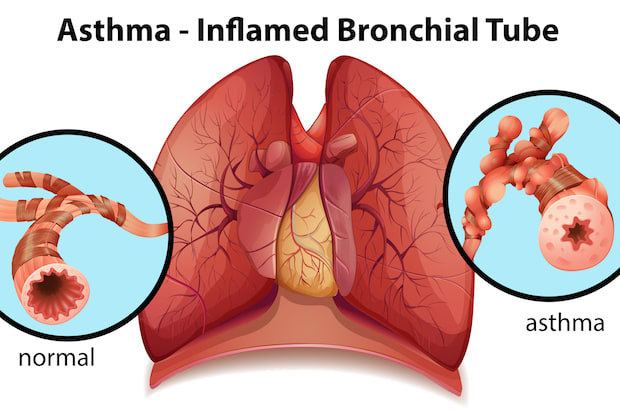Table of Contents
I. Managing Symptoms of Asthma
II. Sleep-Related Complications
III. Consequences of Reduced Physical Activity
IV. Psychological Complications of Asthma
V. Airway Remodeling and Respiratory Failure
Managing Symptoms of Asthma
For most people affected by this respiratory disease, asthma is a chronic condition that can lead to many health complications if left untreated. Asthma is characterized by symptoms of wheezing, coughing, and difficulty breathing, which can intensify during an asthma attack.
These symptoms should be managed with asthma medications like Advair, Flovent, mometasone, and montelukast to prevent complications from developing. These asthma treatments are available from a reputable online pharmacy like MediCare Pharmacy. Read on to learn about the possibly dangerous complications of asthma.
Sleep-Related Complications

Our body needs proper sleep to function during the day. Sleep is essential for recovering fatigued muscles and tired organs, and is critical for your ability to focus. For many people affected by asthma, night-time symptoms can disrupt quality sleep and interfere with the body’s natural sleep cycle. When it’s difficult to breathe, it becomes more difficult to fall asleep.
If your asthma symptoms are always keeping you up at night, you may develop severe sleep deprivation. Inadequate sleep can deplete your body of the energy it needs to drive, work, or run errands safely. Sleep deprivation is especially dangerous if you work in a risky environment where physical injury may occur. [2]
Consequences of Reduced Physical Activity

Having asthma can often sideline you from participating in sports or other forms of physical exercise. Stopping physical activity can cause you to lead a sedentary lifestyle, which can significantly increase your risk of diabetes, high blood pressure, weight gain, and depression.
If you want to stay active, you can try exercises that are easier on the lungs. Even though it may feel counter-intuitive, exercising can actually reduce inflammation and improve lung capacity. When starting a new exercise, start slowly to avoid exercise-induced asthma attacks. [1] Many people with asthma say that swimming or walking are great activities to start. Gentle hiking or recreational biking are other low-impact options.
Psychological Complications of Asthma
In the past, researchers only focused on the physical impact of asthma. Recently, there has been a growing awareness of the impact of asthma on mental and emotional health. Although the exact relationship between asthma and mental health still needs to be further studied, it is clear that living with asthma can increase your risk of depression. The reverse is also true—anxiety and depression can worsen asthma symptoms. [3]
Stress, depression, and anxiety can alter your breathing habits. Those who have anxiety are more likely to experience hyperventilation. Hyperventilating can trigger an asthma attack in some people, which is why stress management is very important. If you feel like a stress management technique can help your condition, ask your doctor about cognitive behavioral therapy (CBT). CBT is a talking therapy that strives to help patients understand how their thoughts can cause physiological reactions.
Airway Remodeling and Respiratory Failure

Most types of asthma can result in changes in the airways if left untreated for too long, and chronic inflammation in the airways can occur. Chronic airway inflammation can quickly lead to permanent structural changes in the airways (airway remodeling). These structural changes can cause:
- Chronic coughing
- Airway wall thickening
- Increased blood supply in the airways
- Increased mucus production
- Loss of lung function
If you lose lung function, you are at risk of respiratory failure. This complication occurs when not enough oxygen is able to reach your bloodstream. This complication is potentially life-threatening and should be treated immediately to avoid death.
You may feel defeated after reading about the health complications asthma can cause. Yes, asthma can be a serious condition, but it is possible to avoid these complications and live healthily with the proper care. An active life, a healthy diet, and a customized treatment plan can go a long way in preventing asthma attacks. Gradually increasing the intensity of your workouts can strengthen your lungs and make your favorite sports easier to enjoy. Don’t let asthma stop you from living life to the full. Visit MediCare Pharmacy's asthma blog page to find out more about treating this respiratory illness. Talk to your doctor about asthma medications, quick-relief inhalers, and the right treatment plan for you.
The content in this article is intended for informational purposes only. This website does not provide medical advice. In all circumstances, you should always seek the advice of your physician and/or other qualified health professionals(s) for drug, medical condition, or treatment advice. The content provided on this website is not a substitute for professional medical advice, diagnosis, or treatment.
Reference Resources
- [1] American Lung Association lung.org/lung-health-diseases/
- [2] National Library of Medicine pubmed.ncbi.nlm.nih.gov/30199406/
- [3] National Library of Medicine ncbi.nlm.nih.gov/pmc/articles/PMC2869336/






